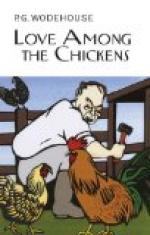“Rum old buffer,” said Ukridge meditatively, pouring himself out another whisky and soda. “My goodness, I should have liked to have seen him in the water. Why do I miss these good things?”
CHAPTER XII
SOME EMOTIONS AND YELLOW LUPIN
The fame which came to me through that gallant rescue was a little embarrassing. I was a marked man. Did I walk through the village, heads emerged from windows, and eyes followed me out of sight. Did I sit on the beach, groups formed behind me and watched in silent admiration. I was the man of the moment.
“If we’d wanted an advertisement for the farm,” said Ukridge on one of these occasions, “we couldn’t have had a better one than you, Garny, my boy. You have brought us three distinct orders for eggs during the last week. And I’ll tell you what it is, we need all the orders we can get that’ll bring us in ready money. The farm is in a critical condition. The coffers are low, deuced low. And I’ll tell you another thing. I’m getting precious tired of living on nothing but chicken and eggs. So’s Millie, though she doesn’t say so.”
“So am I,” I said, “and I don’t feel like imitating your wife’s proud reserve. I never want to see a chicken again. As for eggs, they are far too much for us.”
For the last week monotony had been the keynote of our commissariat. We had had cold chicken and eggs for breakfast, boiled chicken and eggs for lunch, and roast chicken and eggs for dinner. Meals became a nuisance, and Mrs. Beale complained bitterly that we did not give her a chance. She was a cook who would have graced an alderman’s house and served up noble dinners for gourmets, and here she was in this remote corner of the world ringing the changes on boiled chicken and roast chicken and boiled eggs and poached eggs. Mr. Whistler, set to paint sign-boards for public-houses, might have felt the same restless discontent. As for her husband, the Hired Retainer, he took life as tranquilly as ever, and seemed to regard the whole thing as the most exhilarating farce he had ever been in. I think he looked on Ukridge as an amiable lunatic, and was content to rough it a little in order to enjoy the privilege of observing his movements. He made no complaints of the food. When a man has supported life for a number of years on incessant Army beef, the monotony of daily chicken and eggs scarcely strikes him.
“The fact is,” said Ukridge, “these tradesmen round here seem to be a sordid, suspicious lot. They clamour for money.”
He mentioned a few examples. Vickers, the butcher, had been the first to strike, with the remark that he would like to see the colour of Mr. Ukridge’s money before supplying further joints. Dawlish, the grocer, had expressed almost exactly similar sentiments two days later; and the ranks of these passive resisters had been receiving fresh recruits ever since. To a man the tradesmen of Combe Regis seemed as deficient in Simple Faith as they were in Norman Blood.




